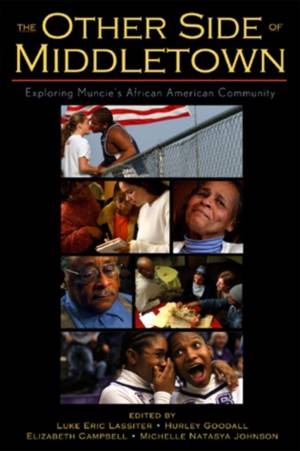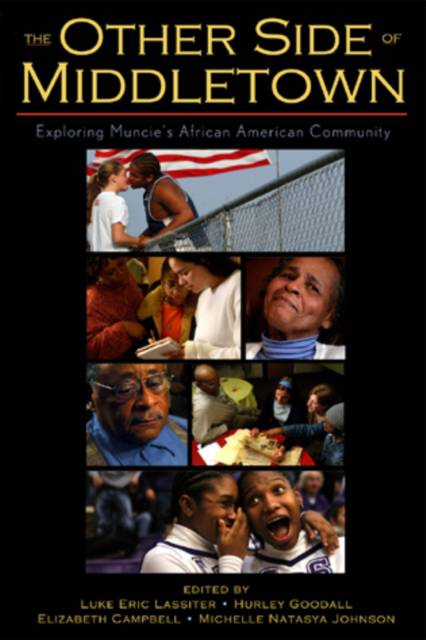
- Afhalen na 1 uur in een winkel met voorraad
- Gratis thuislevering in België vanaf € 30
- Ruim aanbod met 7 miljoen producten
- Afhalen na 1 uur in een winkel met voorraad
- Gratis thuislevering in België vanaf € 30
- Ruim aanbod met 7 miljoen producten
Zoeken
The Other Side of Middletown
Exploring Muncie's African American Community and Middletown Redux
Luke Eric Lassiter, Hurley Goodall, Elizabeth Campbell, Michelle Natasya Johnson
Boek | Engels
€ 46,45
+ 92 punten
Uitvoering
Omschrijving
Prompted by the overt omission of Muncie's black community from the famous community study by Robert S. Lynd and Helen Merrell Lynd, Middletown: A Study in Modern American Culture, the authors initiated this project to reveal the unrecorded historical and contemporary life of Middletown, a well-known pseudonym for the Midwestern city of Muncie, Indiana. As a collaboration of community and campus, this book recounts the early efforts of Hurley Goodall to develop a community history and archive that told the story of the African American community, and rectify the representation of small town America as exclusively white. The authors designed and implemented a collaborative ethnographic field project that involved intensive interviews, research, and writing between community organizations, local experts, ethnographers, and teams of college students. This book is a unique model for collaborative research, easily accessible to students. It will be a valuable resource for instructors in anthropology, creative writing, sociology, community research, and African American studies. It may be purchased with a companion DVD, Middletown Redux, which recounts the making of the Other Side of Middletown, illuminating the development of this rewarding ethnography out of joint fieldwork, and the strong ties formed as a result between the local communities.The Other Side of Middletown project is sponsored by the Virginia B. Ball Center for Creative Inquiry in Muncie, Indiana. Middletown Redux is a twenty-six-minute documentary that recounts the development and writing of The Other Side of Middletown, written in response to the overt omission of Muncie's black community from the famous study by Robert S. and Helen Merrell Lynd, Middletown: A Study in Modern American Culture. In their own words, faculty, students, and community members comment on the project's evolution and the relationships formed between the campus and community. This informative and compelling film illustrates the process of creating a rich ethnography out of fieldwork and the rewards of collaborating with local communities. Middletown Redux is directed by James Miles and produced by the Virginia B. Ball Center for Creative Inquiry, Ball State University.
Specificaties
Betrokkenen
- Auteur(s):
- Uitgeverij:
Inhoud
- Aantal bladzijden:
- 288
- Taal:
- Engels
Eigenschappen
- Productcode (EAN):
- 9780759106680
- Verschijningsdatum:
- 16/12/2003
- Uitvoering:
- Boek
- Afmetingen:
- 168 mm x 227 mm
- Gewicht:
- 557 g

Alleen bij Standaard Boekhandel
+ 92 punten op je klantenkaart van Standaard Boekhandel
Beoordelingen
We publiceren alleen reviews die voldoen aan de voorwaarden voor reviews. Bekijk onze voorwaarden voor reviews.











